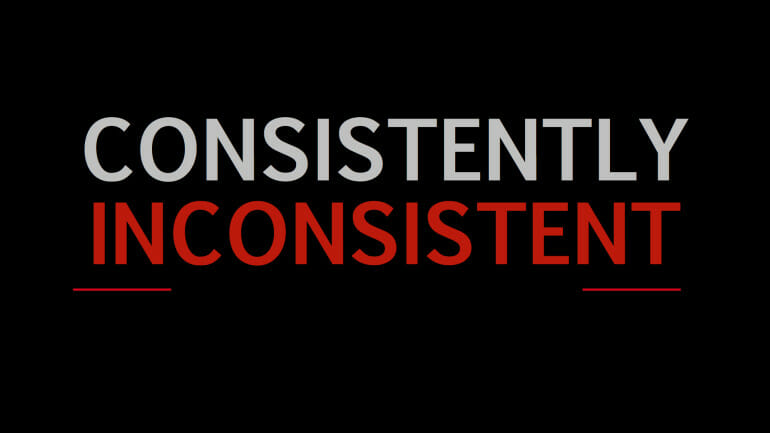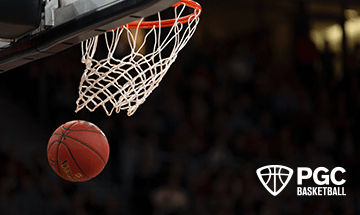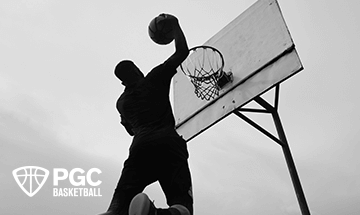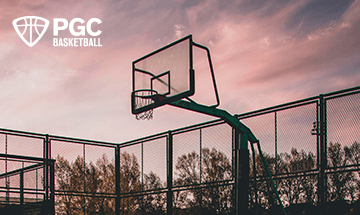Why Is My Performance Inconsistent?
MY Up & Down Performance
Do you ever feel like your performance in games is consistently inconsistent? That you’re putting in the same hard work at basketball practice every day, yet some days you play really well and others you don’t play well at all? If that’s you, you’re not alone. If that’s not you, don’t worry—the frustration is coming soon!
All players experience ups and downs over the course of a season. As I’ve been able to train and work with athletes all over the country, several times a year I hear from an athlete who’s experiencing the frustration of inconsistent play; and I enjoy the opportunity to walk with them through the struggle.
Check out the correspondence below between me and an athlete who’s been dealing with inconsistency in his performance. I hope my response to this player can serve you somewhere along your basketball journey!
————————
Coach Chad,
We just finished our second game of the season. In the first game, I had 27 points and everything seemed to go my way, but this game I had 6 points and went like
3-for-12. Although I played good defense, I’m still upset about how I performed on the offensive end. I know I’m going to come out and practice harder than ever tomorrow, but other than that what can I do to try to come back from a game like this and perform better and more consistently?—Bryce
Hey Bryce:
First of all, thanks for reaching out and starting this conversation. It shows how seriously you take your game! While I understand the frustration that can come from experiencing some ups and downs during a season, my advice is not to overthink a single night or single performance like the one you had. Part of being human is experiencing the peaks and valleys of performance. You can’t have one without the other. The more you work on your skills, the more consistent you’ll become, but you’ll still have those tough games.
What you’re going through reminds me of Steph Curry’s experience during the NBA finals last year. In Game 2, he had one of the worst shooting performances of his NBA career, shooting 5-of-23 from the field and 2-of-15 from 3-point range to go along with 6 turnovers. As bad as those numbers were, no one thought Steph’s performance in Game 2 was because he had stopped working on his skills during the Warriors playoff run.
It was because he is human, and human performance is full of variables.
Defense will always have some type of effect on the offensive performance of a player, and the defense may have been better in the second game of your season. However, offensive variance should also be expected and even embraced (embracing it can be really tough—I’ll get to that later).
What separates poor players from good players is their response to this variance. What poor players do after a poor game is think about that bad game for weeks and even think themselves into a “slump.” Good players’ approach is completely different.
Steph didn’t sink into a hole of depression or doubt. In fact, I would bet he began focusing on how well he was going to play in Game 3. And you can be sure he got himself into the gym and continued his work routine. Here’s what Steph said right after Game 2:
“I doubt this will happen again, with the adjustments I’ll make once I look at the film. And like I said, one game is not going to make me stop shooting or alter my confidence at all.”
Just like that, Steph was back to being Steph in Game 3. He finished with 27 points, going 10-for-20 from the field and 7-for-13 from the 3-point line.
The pendulum swung back towards his true capabilities. It’s the law of averages.
Bryce, don’t be down in the dumps because of a poor performance. That may cause some of your teammates to think you care more about your individual performance than the team result. Instead, after any poor performance, ask yourself this question: Have I been consistently putting in the work on my skills?
If the answer to that question is, “No,” then that’s your issue. You need to immediately begin putting in more time on your craft and train according to your aspirations. However, if the answer to that question is, “Yes,” then you’ve got to embrace the bad performance for what it is—human variance—and actually experiment with GETTING EXCITED ABOUT THE NEXT GAME!
Let me explain: If you put in the work, which in your case I know you do, and you daily get up hundreds of shots quicker than game speed (so it feels slow in the game), then I would guess you shoot somewhere between 40 and 50% in games. So, if you have a night where you go 2-of-10, assuming good shot selection, it’s likely the next game you’ll go 6-of-10 or 7-of-10. It’s just the average for your skill level. Don’t get me wrong, during my career I didn’t tell people that that was my approach, but it was exactly how I thought.
I knew there were games I’d go 4-of-6 from the 3-point line and others I’d go 1-of-5, and I wouldn’t get too depressed or excited over either. It would all average out. I used this approach to my advantage, and I know you can, too. Choose to focus on the side of the equation that’s going to boost your confidence.
If I had a game where I went 4-of-5 from the 3-point line, I’d spend that night thinking about the fact that on some nights I just didn’t miss. I’d think about how incredible I was as a shooter, all the while knowing I was still going to get up at 5 am the next morning and continue to improve. If I had a game where at halftime I was 1-of-4, I’d think, “The next 3 or 4 shots are going in. They have to—it’s the law of averages.”
After a poor shooting game, I always got excited for the next playing opportunity. I remember literally thinking, “I’m about to go off next game!” I knew that I was a 50% shooter, which meant it was probable I’d shoot near 75% the game after an off night. Obviously, these numbers don’t play out accurately every other game, and there were many times I’d shoot below average for two or more games in a row. But the principle never failed me. If I continued to put in the work in my own time outside of practice, I’d follow that poor stretch with a stretch of games where I felt like I couldn’t miss and would shoot above 50%.
It’s all about choosing to control where you put your attention. A bad offensive performance only means what you decide it means in your mind after the game.
And, Bryce, don’t forget that all of this should be your secondary focus after winning and doing everything in your power to help your team win. There are so many other things you should be doing each night to help your team be successful—rebounding, defense, loose-ball hustle, etc. As a player, I always put that as my first priority, whether I was shooting well or not.
Best wishes,
Coach Chad

Quit Training Like Everyone Else…
In this FREE video series, you’ll learn 3 secrets most players will sadly go through their entire career without ever discovering..
Related Articles
How To Win The Inner-Game of Basketball (and Life)
As a basketball player, just like so many other walks of life, players do not operate at max capacity because they are extremely hard on themselves and are losing the ‘inner game.’
What Does It Mean To Be Self-Disciplined?
In the game of basketball, self-discipline is a word that all coaches want players to embody on a daily basis. The word ‘Discipline’ is used for some teams as their standard of excellence, for others it is a pillar that their culture is built upon.
A Champion’s Soul
Muhammad Ali famously said “The fight is won or lost far away from the witnesses, behind the lines, in the gym and out there on the road; long before I dance under these lights.”
About PGC
PGC Basketball provides intense, no-nonsense basketball training for players and coaches. Our basketball camps are designed to teach players of all positions to play smart basketball, be coaches on the court, and be leaders in practices, games and in everyday life.
We combine our unique PGC culture with a variety of teaching methods and learning environments to maximize the learning potential of those that attend our sessions. In addition to spending 6-7 hours on the court each day, lessons will be reinforced through classroom sessions and video analysis.
Our goal at PGC is to empower you with the tools to fulfill your basketball dreams, while also assisting you in experiencing the joy of the journey.
To learn more about PGC Basketball, including additional basketball training tips and videos, visit our YouTube Channel or find us on Facebook, Instagram, and Twitter.














Share This Post